- Home
- Ian Wallace
A Voyage To Dari Page 15
A Voyage To Dari Read online
Page 15
“Essentially stupid?”
“Excuse me, sir, you know my name, but I do not know yours.”
The right fist of the knight closed on a waist-sheathed poniard; he drew himself erect. “Call me Roland. And what we do is by command of our grand seigneur. I am discomforted to hear that you consider him stupid. I would wish to test your assertion in combat, but it is for him to listen and declare me his champion. And now it will be necessary to kill you in the manner that my liege lord may elect. Will you go with me voluntarily, or must we paralyze you and drag you?”
“Sir, I am at your service. In any way you may specify. But as an enemy.”
Slightly inclining his head, Roland stated, “Sir, I have been in there. I respect you as my enemy.”
Then Roland added an odd addition, hesitantly, softly. “Sir, my allegiance to my liege is boundless. But it may be that after you have met my liege, I will wish to discuss with you your suggestion that he may be stupid.”
THE CASTLE THAT ROSE from the gray plain (in place of the museum in the city complex) possessed, Croyd noted, anachronisms. It was built in the architectural-engineering motifs of a Gothic cathedral: with high pointed arches framing broad doorways and windows (but arches whose austerity was unrelieved by figurine lacery); with soaring columns and ceiling arches and flying buttresses lofting the mass with the skeletal economy-genius of steel girders in postmedieval skyscrapers or like the spun-glass silicates of Croyd’s own time in situations where forcefield construction was impractical. There were only two hitches: the architectural genius of Gothic architecture had scarcely emerged, and was far short of this degree of clean sophistication, in the era signaled by the superficially golden but actually brazen and fundamentally crude armor of Childe Roland; and since the castle had no mass, the mass-buttressing Gothic construction it did not need.
This castle had no mass. Its appearance was massive, but when Croyd smartly hand-slapped the facade, the feeling he got was a familiar forcefield feeling. This castle was, in fact, like the birthplace fantasies, a towering illusion—not in the mind of Croyd, but required of Croyd’s optic thalamus by stabilized mental direction from outside. And the form of the castle was due not to architectural evolution or to functional necessity but to someone’s aesthetic whim.
Suspicion grew in Croyd’s mind that he had been trapped in a grimly total antithesis of Dari.
Behind him, Roland courteously suggested, “We have audience within.”
Croyd whirled on him, but Croyd was thinking as he whirled: thinking regrettably slower than his habit, thinking only at the peak speed that an ordinary human can drive himself to. He was coming rapidly to a conclusion that this metagalactic fissure was somehow under control by an advanced human mind in a high culture located somewhere else. If so, the organization of the fissure and the form of its illusions reflected the quality of that mind—either a mind formidable beyond what Croyd’s had been, or a mind deploying apparatus more sophisticated-powerful than anything ever at Croyd’s disposal, or both. And some of the motives and characteristics of that mind were coming clear by inference. (He was halfway around to Roland in his whirl.)
Obviously the mind admired feudalism, since the two prime stable illusions that he had encountered—Roland and this castle—were medieval-feudal in motif, although a shade off tempo: medievalism had, after all, spanned on Erth at least ten centuries of development; and, now he thought about it, had spanned about the same duration on Moudjinn. Croyd entertained a preguess that in the fissure this mind—from Moudjinn?—had set up an approach to pure feudal organization, complete with chivalric illusions. He was beginning to think of the mind as Lord of the Fissure.
Either this lord was historically so ignorant that he fell into anachronisms, or, for aesthetic reasons of his own, he brought together whatever he preferred to bring together, disdaining possible charges of anachronism. The latter was more likely. A third possibility, that this lord was creating anachronisms out of whimsy, Croyd discarded: as whimsy went, thus far it had all been a bit heavy-handed.
Meanwhile, was Tannen safe? Eh, but Tannen was with Chloris. There he was at least as safe as Croyd unprotected by special powers or anything else. As for Djeel and Hanoku and Gorsky, though . . .
He was completing the whirl: the impassive face of Roland was coming full into his central vision. Roland’s helmet-visor was up; his wide-apart eyes were calm-blue, his nose was aggressive, his ruddy-bearded mouth was big-sensual; under the beard his chin and jaw were square and deep. Roland asserted, “Sir, courtesy requires that I allow you to precede me; but since presumably you do not know the way or anything else, another kind of courtesy seems to require me to . . . ”
Croyd grinned, “You never told me how big you are, really.”
Having cleared his throat, Roland with dignity rejoined, “You look as though you might wish to wrestle.”
Croyd dropped arms. “Would that be good manners hereabouts?”
“It would be more in order to joust.”
“All right. I have a passionate desire to do something.”
It won a grim smile from Roland. “Sir, evidently we have something to talk about—later—if there should be for you a later. But just now, we have audience within. Pray follow me.”
Brushing past Croyd, he strode into the castle. Croyd followed, noting well the vulnerable target of Roland’s back (it was very old-fashioned jousting armor, backless, trustfully designed for frontal clash); noting also with new respect that Roland disdained fear of a treacherous attack. But then, heigh-ho: Roland had been in there, he must know Croyd a little. Or else—and this was another sort of consideration—a physical attack would be quite irrelevant to this Roland.
This would be the first meeting between Croyd and Duke Dzendzel. There would be later meetings.
For Croyd it was a disconcertingly retrograde situation, taking him back to his boyhood on Nigel III (and then also he had possessed no special powers) when once in a long while his father, King Grayle, would find it advisable for disciplinary reasons to summon the youth into private audience in his great hall rather than in his private apartments. This hall itself was astonishingly a near-replica of his father’s great hall (vast and stony and rough-raftered, anachronistic again in this much-later-type Gothic castle); and at the far end of it, there, perched on a low throne on a low dais, was
his father Grayle?
Catching himself shriveling, Croyd stiffened. Grayle had been small, tough-small; but that small figure was not Grayle, because Grayle would have been draped on his throne informally with arms and legs gauchely curling about his throne for comfort, whereas that figure was poised on his throne in approximately the manner of Gregory VII.
Forcing himself back into poise, Croyd advanced the length of the hall several paces behind Childe Roland, ignoring a thin but sufficient armed guard that flanked Duke Dzendzel; and although Croyd’s feet were bare, he imagined that he could hear the old hard leather of his heels assaulting flagstones and echoing in the vault.
He noticed then, continuing to advance, that the feet of Roland were silent too. And this was totally irrational: the spurs of Roland scraping should have been striking sparks on the stones.
Roland knelt. On one knee. Head down. All of a sudden.
Croyd froze.
At that point, the duke should have spoken carelessly to his familiar high vassal Roland. Instead, sharply he commanded, “Stand, Childe Roland, and stand to one side, and summon your prisoner forward.” His vibrant tenor had a faint nasal quality.
That was when Croyd measured his man. The duke was dangerous. But also, he was pompous. And so he had no friends—only servants.
With difficulty Croyd required himself to kneel on both knees before the duke, bowing his head in submission.
He heard the voice. “You are Croyd, not Pan?”
“Yes, sir.” The question was odd, unexpected, implicative of something.
“Address me properly!”
Croyd
began to mumble something.
“Speak up, varlet!”
Biting a lip to repress a grim chuckle-blurp, Croyd said clearly, “Sir, I have not been instructed how to address you.”
“Address me as your liege.”
“Yes, your liege.”
Electrostatic silence. The voice then seemed a bit strident. “Roland, instruct him how to address me.”
Roland said—and, not daring to look, Croyd would have bet that the face of Roland was struggling for control—“When you speak to the duke, say to him, 'my liege.’ ”
“My regrets, my liege,” Croyd responded. Then, unexpectedly, his face came up. “Sir, you know my name, but I do not know yours.”
It froze the duke; to his credit, he held stiff on his throne, not rising or even jerking. Looking angry-direct down at Croyd, he incised, “Roland, this man does not appear to know who I am.”
Roland said, dead, “My apologies, my liege. Croyd, this is Dzendzel, Archduke of Moudjinn, Lord of the Fissure. These titles are quite sufficient for him; he requires no extravagance. And I think he would prefer that you bow your head again.”
Croyd ducked his face, telling the floor, “Lord Dzendzel, then. My lord, I crave permission to express an idea or two to my liege, after my liege has expressed the ideas that he may wish to express to me.”
The voice went sardonic. “You are here. Your companions are accessible to me. After I have taken care of you, I may or may not bother to deal with them. There was a time when you and I might have been worthy adversaries; but we have reduced you to a most pitiable condition, and I really don’t know why I trouble with you, unless it is because I am an admirer of your Marquis de Sade. Those are all the ideas that I wish to express, really. I shall not cany my sadism to grotesque lengths; I see you subject-powerless, that is almost enough; your obstacle to my dream is done. I think you said that you wished to express an idea?”
Up came Croyd’s face, and on it he had schooled an expression of simple honesty. “I will not call you my liege, Duke Dzendzel, because you are not my liege: we are enemies. I acknowledge my total physical submission. I anticipate immediate death. Sir, is there anything—anything—that can prevent immediate death?”
The face of the duke was serene. “Your friend Pan might have prevented this, but unhappily, he has run away again.”
That bit. Croyd suggested, “I would appreciate a detail or two.”
“I can afford to spare you a detail or two. I need the powers that you have lost. I had a pact with Pan; I had counted on him to supply these powers. Had he stayed with the deal, I would simply have left you to languish with your friend in our nonspace Arcadia. But Pan has unaccountably disappeared, and so has his consort Freya; and while of course they may reappear, it is wisest for me to make do without them. So tomorrow, Croyd, I will be subjecting you to a brain scan, to recover from your brain the latencies of the powers that you can no longer deploy, so that I may deploy them myself. And the scan will be fatal, although not before it begins to be rather intolerably painful.”
It threw Croyd into swift speculation. Suffering for two years over Pan’s abandonment of a trust, yet implicitly comprehending the why of this desertion, he had kept private track of Pan; he knew all about Saturninn. That Pan should make a power deal with Dzendzel, this might be more of the same; but that Pan should run out on Dzendzel, totally losing himself and Freya—was this perhaps the good sort of runaway? Was there even a chance of a rescue operation? It was a great deal to digest in moments; and he concluded, like Dzendzel, to forget Pan. Unquestionably, during tomorrow’s brain scan Dzendzel would be probing among other probings for whatever knowledge or speculation Croyd might entertain with respect to Pan; and this reflection caused Croyd instantly to scramble his thoughts, hopefully beyond possibility of recovery.
He stood. “In that case, Duke Dzendzel, as governor to duke, I express a last wish. May we perhaps pass an hour talking politics in private—except, perhaps for the presence of Roland?”
All in the room went taut. Duke Dzendzel, wiry-keen, considered his prisoner. He said presently, “Croyd, you have no powers beyond those of an ordinary man; and while I do not yet have all the powers that you once possessed, I have enough of them to reduce you to pain-quivering jelly. Do you really wish to talk with me in private?”
“Already you have intimated that tomorrow you will be reducing me to pain-quivering jelly in the course of a brain scan. I see no difference to my own comfort. Yes, I wish to talk with you.”
The duke sighed. “I would like that, too, because I could take occasion to obviate the brain scan by milking your brain with projective hypnosis. But the process would be prolonged and inefficient; we can do it much better tomorrow with a brain scan. And my mood now does not incline toward theoretical discussions of political issues that I have already settled for myself—and, now I think about it, for the metagalaxy. So before I put you away for the evening, do you have perhaps a practical question?”
Croyd glanced at Roland; the knight was frowning down. Croyd then addressed the duke. “Sir, I know that you are not unimportant on Moudjinn, I merely want to inquire—what about the treaty? And what about Dari?”
Scornfully Dzendzel mimed the tearing and tossing of paper. Placing hands on knees, he queried, “Any truly practical questions?”
“Only a request, sir, not a question. I would wish to have President Tannen and all aboard the Castel Jaloux placed safely somewhere in Sol Galaxy, or in Djinn Galaxy, or in Andromeda, whichever is easiest.”
Calm reply: “All of them know that something powerful and hostile is operating in this metagalactic fissure. Consequently, they are dead.”
Croyd’s head went down. “Then I have nothing further.
I am at your mercy.” Slowly he went to his knees.
Roland tugged at his beard; he seemed amazed. Then Roland’s mouth clamped shut, and he appeared stern and disappointed.
Dzendzel, standing, said, “Roland, pray conduct the prisoner to the dungeon keep. Croyd, inadvertently I have said the word pray; and if you have gods, I suggest you pass the night praying to them, because tomorrow will be difficult. Do not bother to sleep; we will keep you awake tomorrow—all day tomorrow—with a total and minute brain scan whose associated pain I rarely bother to block when I am watching. And when that is done, believe me, you will sleep.”
Descending from the dais, he made an insolent point of bruising with his knee the nose of a Croyd whose head was far down in desolate submission. And he departed the hall.
The dungeon keep was not anachronistic, because it was cruel and therefore timeless.
Roland led him, this time between two guards with ponairds drawn, down many coiling stairways of pseudostone, debouching semifinally on a broad low-vaulted level whose floor was wet clay. (It was pseudowet, of course; the sophisticated illusion convincingly included even dank!) Paces ahead of him, in the floor, Croyd saw a hole. Roland went to it; the guards ponaird-prodded Croyd thereto. Roland turned, faced Croyd, and pointed down. Croyd looked down; he saw black.
Roland told him, “The floor of the keep is five meters down. We will let you down by your arms as far as possible, then drop you. If you grope for a while, eventually you will find bread and water; just don’t kick over the water. You may also find neighbors; but they will not be human, so you may as well ignore them.”
Their eyes met at a common level. Croyd remarked, “Your Lord of the Fissure is stupid.”
After a moment, Roland, without turning, addressed the men-at-arms. “The prisoner’s remark requires discipline.
I prefer to do this alone. You are dismissed.”
Oddly, they just vanished.
Croyd queried, “Are they illusions?”
“No more than I. They are my servants; I can make them vanish—permanently, if I choose. Just so, I am the duke’s vassal; he can make me vanish—permanently, if he chooses. Do you not agree that it is an excellent way to run a feudalism?”
“I
agree with my whole heart.”
“Then why do you keep saying that he is stupid?”
“He refused to talk political theory with me on the ground that he has already settled all theories; he is therefore afraid of being outtalked. He refused to save my friends because they know too much; yet I guess that he has the power to extirpate their recent memories and still save them if he would wish. Apparently he has not grasped that I comprehend the illusory nature of this fissure realm, or he would not have trumped up the silly elaboration of this dungeon keep; he would simply have immobilized me somewhere. And . . . he has appointed you to be my guard.”
Up came Roland’s beard; his eyes were higher now then Croyd’s, looking down. “The last fact makes him stupid? Why?”
“From this last fact it is evident that he has not noticed two facts about yourself. You are a true knight, imbued with the high principles of chivalry, disdaining unfairness, noticing that his treatment of me and my friends is unfair. And you are beginning all by yourself to notice his ultimate stupidity.”
The chin of Roland came down by a centimeter. “Sir, I am only probing you before I throw you in. I am not agreeing.”
“I understand, sir. You have done well your knightly duty in my brain, and well are you doing it here. Be loyal to your sworn liege, no matter how stupid he may be, no matter how thoroughly he may have programmed you to believe in him. It is chivalry at its finest, for Duke Dzendzel has consecrated himself with l’oint du seigneur.”
Roland was angry. “I discount your blasphemy; you are an outlander. And he did not program me for obedience, he programmed me for intuitive interpretation of chivalric principles. I am a high vassal; there is a range within which I may feudally disobey him without violating his oint du seigneur.”
Croyd was cold. “Feudalism, sir, is merely a structure; chivalry runs deeper, it is an attitude, it is independent of feudalism. If you have a range of disobedience, I suggest that you exercise this range, sir; I suggest that you exercise this range.”

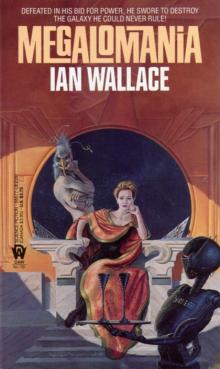 Megalomania
Megalomania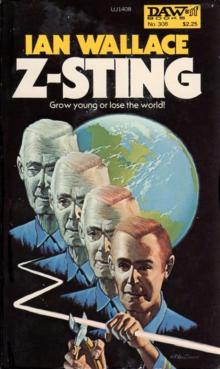 Z-Sting (2475 CE)
Z-Sting (2475 CE) The World Asunder
The World Asunder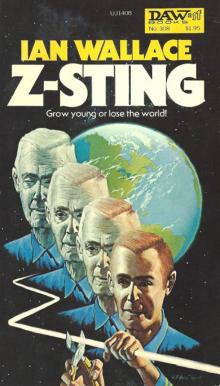 Z-Sting
Z-Sting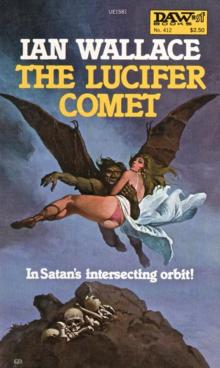 Lucifer Comet (2464 CE)
Lucifer Comet (2464 CE)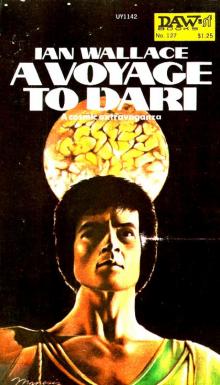 A Voyage To Dari
A Voyage To Dari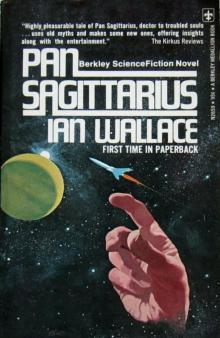 Pan Sagittarius (2509 CE)
Pan Sagittarius (2509 CE)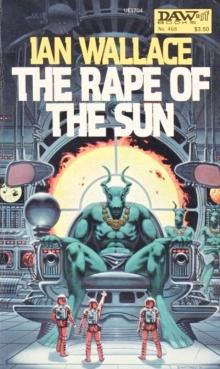 The Rape of The Sun
The Rape of The Sun